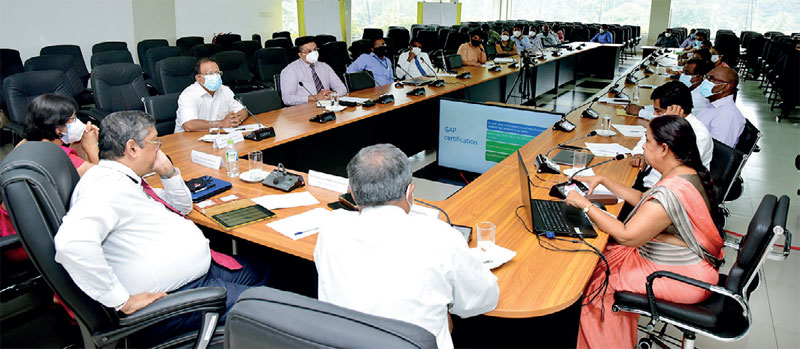Sunday Apr 20, 2025
Sunday Apr 20, 2025
Friday, 26 November 2021 02:14 - - {{hitsCtrl.values.hits}}

A section of the stakeholders present at the forum
The inaugural meeting of the GAP Stakeholder Forum was held with the support of the Technical Assistance to the Modernisation of Agriculture Programme (TAMAP) at the Department of Agriculture in Peradeniya on 17 November.
Ministry of Agriculture Secretary Prof. Udith K. Jayasinghe attended the occasion as the Chief Guest.
The Good Agricultural Practices (GAP) programme, introduced by the Department of Agriculture in 2016, was a promising step taken to minimise adverse impacts of agriculture on the ecosystem and human health while meeting steadily rising demand for food.
Although the programme had an encouraging start, the overall conversion of farmers to implementing GAP remained low. Over the past six years, 1500 farmers registered as GAP producers out of the 1.8 million farmers in Sri Lanka. To align with the current policy of the Sri Lankan Government to improve ecological friendliness of farming, it is important to transform all production units towards GAP farms.
Studies showed that to achieve this goal, the GAP implementation strategies needed to be updated and infused into the mainstream agriculture, facilitating a quick transformation of the current approach towards a macro-level system. Therefore, the requirement for a rapid strategizing of such an approach followed by periodic review of GAP performance arose. This initiated the need for a stakeholder forum.
The key purpose of the forum is to provide a common platform for key stakeholders to meet in formulating a strategy to mainstream SL GAP, propose a way forward for implementation such recommendations, and to regularly review program performance and adopt remedial action to achieve GAP objectives.
Prof. Jayasinghe who chaired the Forum in his opening statement commented, “GAP programme has emerged a solution to challenges faced by Sri Lankan agriculture today to improve safety of users and ensuring good environmental performance. Reinforced by facilitating legislation and approved national standards, GAP programme provides a strong foundation towards addressing above concerns.”
Over 40 participants were present at the forum, representing the various stakeholder groups comprising producers, distributers, SL GAP team, academics, and market players. Addl. Director (Agribusiness) D.S. Ratnasinghe and National Coordinator Dr. W. M. W. Weerakoon outlined the status of the GAP programme and the challenges faced.
The deliberations during the forum were broken down into five main areas: Technical, financial, institutional, and social problems faced by GAP stakeholders on maintaining production, supply, product quality, and consumer trust. Gaps in technology transfer and adoption, marketing and quality control measures and means for increased rate of adoption and GAP farm certification; Gaps in current GAP process and procedures, user friendliness and applicability; Future technological needs towards increasing production, productivity, product quality and ecosystem sustainability; and Policy needs for increased adoption of GAP to mainstream GAP into national agriculture agenda.
Prof. G. Pushpakumara, Faculty of Agriculture, University of Peradeniya and Jayantha Ilankoon, ADG (Dev), moderated the forum through group activity, outcome presentations and strategic discussions on the way forward.
Concluding the forum, Dr. Nihal Atapattu stated: “TAMAP, along with the European Union that provided the funding support is very pleased to have assisted to launch several interventions that would promote recognition of GAP as a premier means of strengthening Sri Lankan agriculture in sustainably meet requirements of the domestic and export markets. TAMAP expects that the Stakeholder Forum launched today will be a milestone event in advancing GAP to achieve its potential in Sri Lanka.”

Secretary of Agriculture Prof. Udith K. Jayasinghe addressing the forum